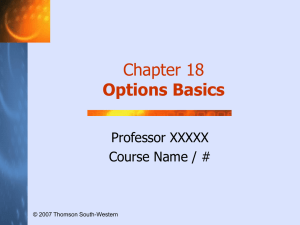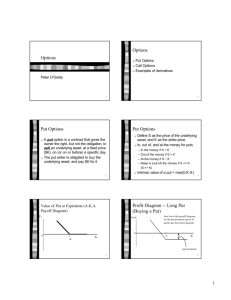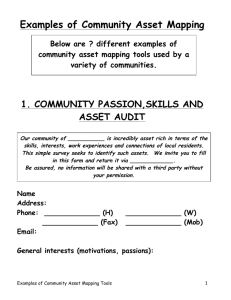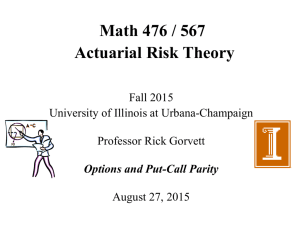Derivative Markets
advertisement
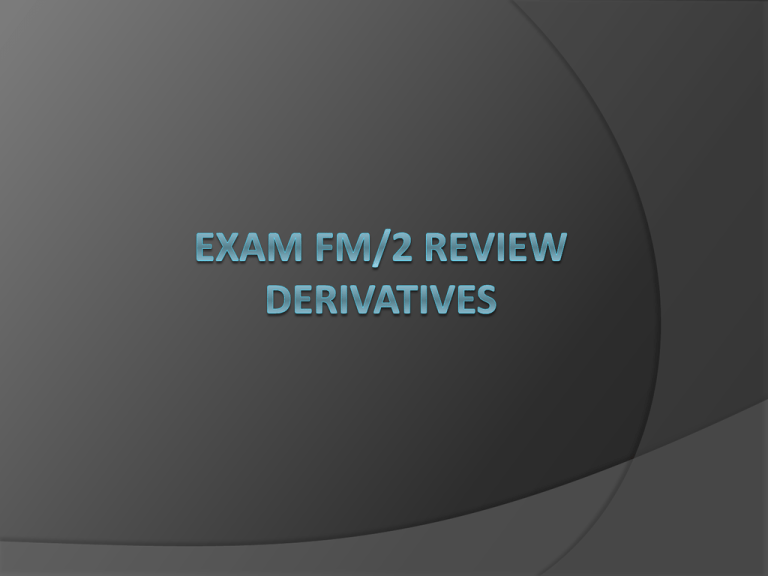
Derivatives A derivative is a product with value derived from an underlying asset. Ask price – Market-maker asks for the high price Bid price – Market-maker bids for the low price Bid-Ask spread is part of the market-maker’s profit(market-maker profit may also include commission from the sale) Positions Short – You profit from declines in the underlying asset value Long – You profit from increases in the underlying asset value Forwards (Long Position) Enter a contract now for some future required payoff even if negative Can be paid now or at expiration Options – gives you the option to exercise at expiration Calls and Puts Options Styles European – can only be exercised at expiration American – can be exercised at anytime Bermudan – can be exercised during specified times; rare Positions In-the-money – Payoff is positive right now At-the-money – Payoff is zero right now Out-of-the-money – Payoff is negative right now Put-Call Parity The cost of buying a call and selling a put must equal the price of today’s stock (or the present value of the forward price) less the present value of the options’ strike price. 𝐶𝑎𝑙𝑙 𝐾, 𝑇 − 𝑃𝑢𝑡 𝐾, 𝑇 = 𝑃𝑉 𝐹𝑜,𝑇 − 𝑃𝑉 𝐾 Synthetically Created Options (using put-call parity) Forwards, Bonds, Calls, and Puts Risk Management Ways to reduce potential losses or securing a gain Diversifiable risk can be hedged, while nondiversifiable (systematic) risk cannot Hedging Covered Call – writing a call plus long in the asset Covered Put – writing a put plus short in the asset Naked Option – writing an option without a position in asset Risk Management Cost to carry Difference between interest and dividend rates Cost for you to borrow and buy stock, then hold it (Reverse) Cash and Carry Short a forward contract and buy the asset Pays off if forward price is too high Combining Options Synthetic forward Obtain the stock in future at price determined today Buy a call and sell a put at same strike price Spreads Bear ○ Buy call and sell higher call or buy put and sell higher put ○ Profit with increase, up to a limit Bull (opposite of bear) ○ Sell a call and buy a higher call or sell a put and buy a higher put ○ Profit with decline in price, to a limit Combining Options Box – constant (often zero) payoff ○ Combination of long and short synthetic forwards or bull and bear spreads ○ No market risk, so only useful for borrowing or lending money Collars ○ Long put and short call with higher strike ○ Zero cost collar – Premiums are equal ○ Collared Stock – Long in stock and buy a collar Ratio ○ Buying and selling unequal numbers of options ○ Can be used for more complicated hedging strategies Combining Options Straddles ○ Purchase call and put with same strike price ○ Profit with volatility in either direction ○ Write a straddle to bet on stability Strangles ○ Straddle with out-of-the-money options to reduce costs ○ Reduced profit with volatility, but lose less in the middle Butterfly spread ○ Write a straddle, then buy put and call on far sides for protection ○ Bets on stability while protecting against losses in either direction ○ Can be asymmetric to shift location of peak Pay Later Strategies Take the following premiums for one-year European options for an underlying asset with a current spot price of $100. The risk-free annual effective rate of interest is 8.5%. Strike Price Call Put $80 $28.34 $2.07 90 21.46 4.41 100 15.79 7.96 110 11.33 12.71 120 7.95 18.55 Determine the net financing cost (net premiums) of: 1. A 100-110 bull spread using call options 2. A 100-120 box spread 3. A ratio spread using 90 and 110-strike options, with a payoff of 20 at expiration price 110 and payoff of 0 at expiration price 120 4. A collar with a width of $10 using 90 and 100-strike options 5. A straddle using at-the-money options 6. An 80-120 strangle 7. A butterfly spread with a at-the-money straddle and insurance options out $10 Answers 1. $4.46 2. $18.43 3. -$12.53 4. -$11.38 5. $23.75 6. $10.02 7. -$8.01 Four ways to purchase a stock Outright purchase Receive now Pay now: 𝑆0 Borrow to pay for the stock Receive now Pay later: 𝑆0 𝑒 𝛿𝑡 Prepaid forward contract Receive in future Pay now: 𝑆0 − 𝑃𝑉(𝑑𝑖𝑣𝑖𝑑𝑒𝑛𝑑𝑠) Forward contract Receive in future Pay in future: Futures contracts Simply a standardized forward contract, sold in exchanges Marked-to-market Changes in value are settled daily through parties Parties maintain margin accounts to cover these changes Swaps Simply a series of forward contracts Payment Prepaid - pay now Postpaid - pay at end Level annual payments - most common Types Commodity, eg. price of corn Interest rate Foreign currency Any of these could be deferred, or start in the future Problem 1 Samantha buys 100 shares of stock but changes her mind and immediately sells the stock. The broker’s commission is $20 on a purchase or sale. Samantha lost $70 on this transaction. What was the difference between the bid and ask price per share? ASM p.487 Answer: $.30 Problem 2 John short sells a stock for $10,000. The proceeds of the sale are retained by the lender. (Ignore interest on the proceeds.) John must deposit $5,000 with the lender as collateral. He earns 6% effective on this haircut. At the end of one year, he closes his short position by buying the stock for $8,000 and returning it to the lender. A dividend of $500 was payable one day before he covered the short. What was John’s effective rate of interest on his investment? ASM p.488 Answer: 36% Problem 3 Arnold buys a one-year 125-strike European call for a premium of $16.86. He also sells a 100-strike call on the same underlying asset for a premium of $31.93. The spot price at expiration is $110. The effective annual interest rate is 3.5%. What is Arnold’s total profit at expiration for the two options? ASM p.512 Answer: $5.60 Problem 4 We are given the following: Forward Price = $163.13 150-European Strike Call Premium = $23.86 150-European Strike Put Premium = $11.79 Determine the risk free rate. ASM p.577 Answer: 8.78% Problem 5 The current price of the stock is $72. The stock pays continuous dividends at 2% and the continuous compounded risk free interest rate is 6%. Determine the forward price in 1.5 years. ASM p.612 Answer: $49.38 Problem 6 A stock has a current price of $65. A dividend of $3.25 is expected to be paid in 6 months. The risk-free interest rate is 10% effective per annum. X is the forward price of a one-year forward contact that has the stock as the underlying asset. Determine X. ASM p.612 Answer: $68.09 Problem 7 Take these forward prices for forward contracts of Stock ABC: Years to Exp. Forward Price 1 $100 2 110 3 120 Take these spot rates of interest: Term to maturity Spot Rate 1 3.0% 2 3.5 3 3.8 X is the level swap price under a 3-year swap contract with the same underlying asset. Determine X. ASM p.630 Answer: $109.56 Problem 8 Two interest rate forward contracts are available for interest payments due 1 and 2 years from now. The forward interest rates in these contracts are based on a one-year spot rate of 5% and a 2-year spot rate of 5.5%. X is the level swap interest rate in a 2-year interest rate swap contract that is equivalent to the two forward contracts. Determine X. ASM p.630 Answer: 5.49%
